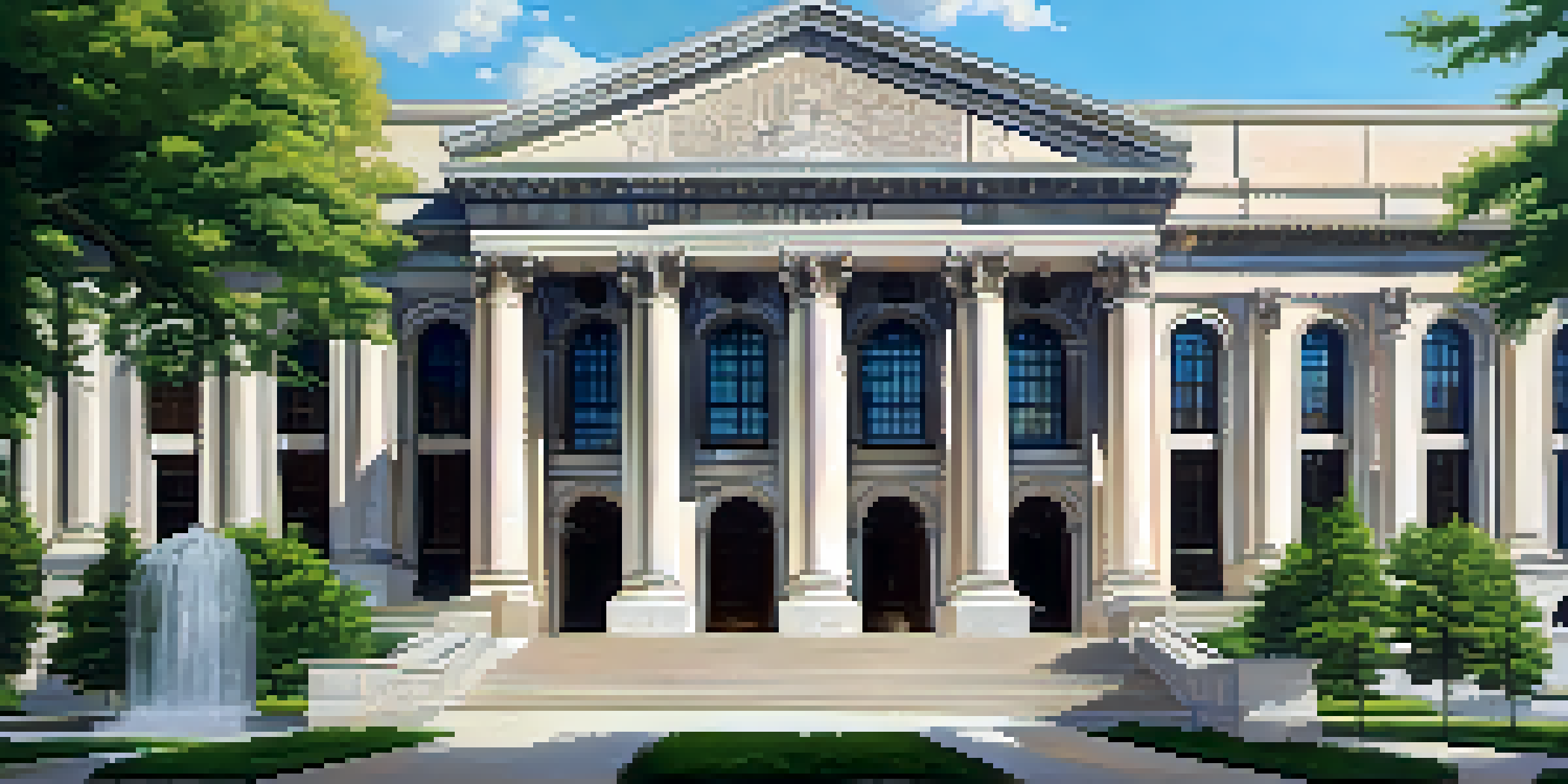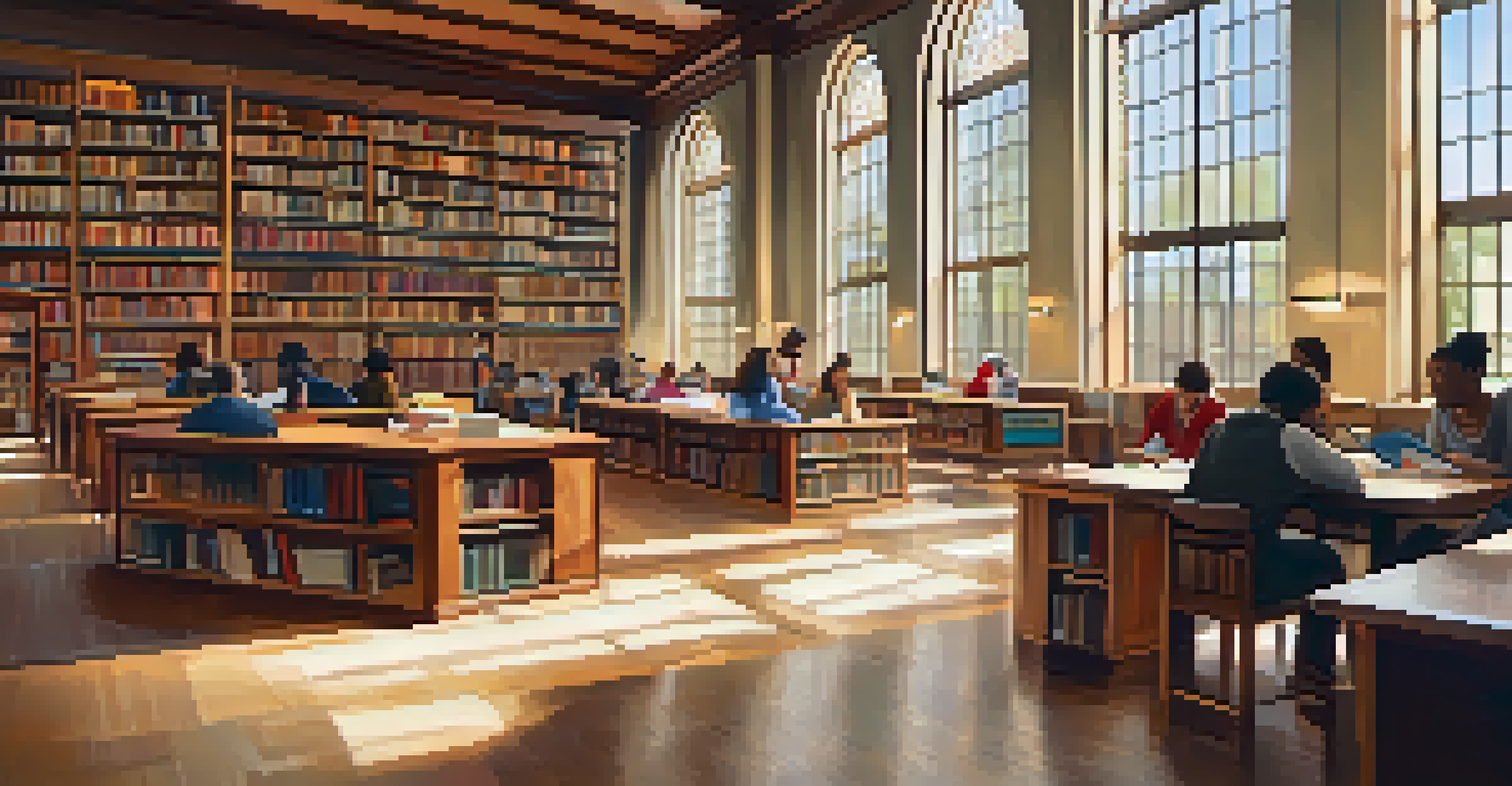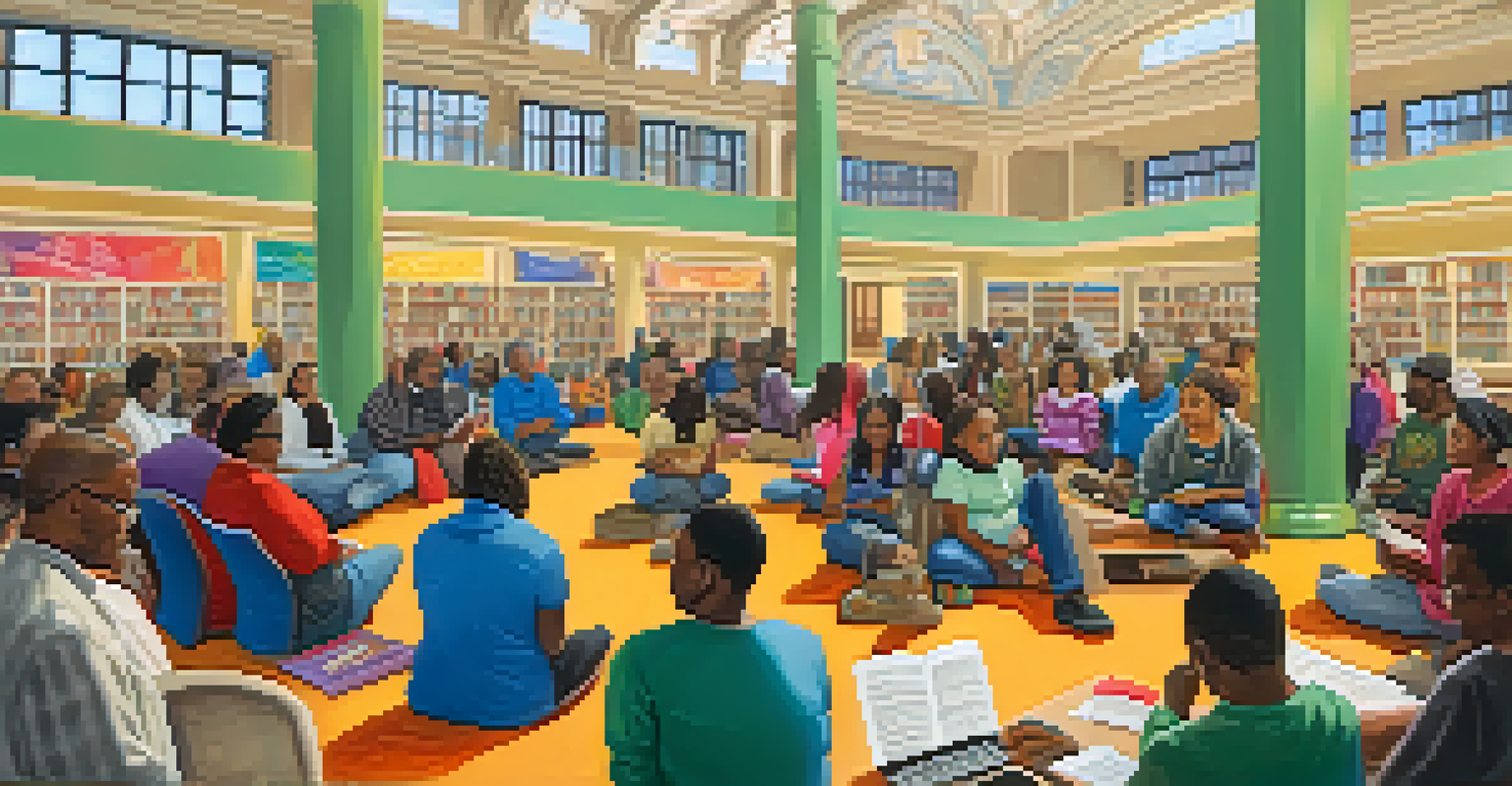Exploring the Historical Significance of Detroit's Libraries

The Origins of Detroit's Libraries: A Historical Overview
Detroit's library system dates back to the early 19th century, reflecting the city's growth and aspirations. The first library was established in 1865, serving as a hub for knowledge and community engagement. This marked the beginning of a journey that would see libraries evolve into vital cultural institutions within the city.
A library is not a luxury but one of the necessities of life.
As Detroit expanded, so did its libraries, adapting to the needs of a diverse population. The establishment of the Detroit Public Library in 1865 played a crucial role in providing access to literature and education for all residents. Libraries became not just places to borrow books, but also centers for social and intellectual exchange.
Throughout the years, the libraries have witnessed significant historical events, including the industrial boom and the civil rights movement. They became safe havens for marginalized voices, supporting community literacy and education initiatives. This historical context highlights the libraries' role as pillars of community strength and resilience.
Architectural Marvels: The Design of Detroit's Libraries
The architecture of Detroit's libraries is as rich as their history, showcasing unique designs that reflect various periods. The Detroit Public Library, for instance, is a stunning example of the Beaux-Arts style, characterized by its grand marble interiors and intricate murals. Such architectural beauty not only serves a functional purpose but also inspires awe and appreciation for the arts.

Each library branch has its own distinct character, from the historic Main Library to the more modern facilities scattered throughout the city. These buildings often serve as landmarks, representing the community's pride and commitment to education. The design elements are intentional, inviting visitors to explore and engage with the space.
Detroit Libraries as Community Hubs
Detroit's libraries play a crucial role as community centers, offering access to resources, technology, and cultural events that foster inclusivity and lifelong learning.
Moreover, the libraries often host architectural tours and events, allowing the public to delve deeper into their design significance. This connection between architecture and community illustrates how libraries are more than just physical spaces; they are reflections of Detroit's cultural identity and history.
Cultural Impact: Libraries as Community Hubs
Detroit's libraries have long served as vital community hubs, offering more than just books. They provide access to technology, workshops, and programs that cater to diverse audiences, enhancing literacy and lifelong learning. This commitment to community engagement fosters a sense of belonging and empowers residents to pursue their interests.
The only thing that you absolutely have to know is the location of the library.
One notable initiative is the Detroit Public Library's focus on outreach programs, which aim to reach underserved populations. These programs include mobile libraries and reading programs in schools, ensuring that every community member has access to resources. Such efforts highlight the library's role in bridging gaps and fostering inclusivity.
Additionally, libraries host cultural events, author readings, and art exhibitions, further solidifying their place in the community. By celebrating local artists and authors, Detroit's libraries enrich the cultural landscape, promoting a vibrant exchange of ideas and creativity.
Preserving Detroit's History: Archives and Special Collections
One of the most significant roles of Detroit's libraries is the preservation of the city's history through their archives and special collections. The Detroit Public Library houses a wealth of historical documents, photographs, and artifacts that tell the story of the city's evolution. These resources are invaluable for researchers, historians, and anyone interested in understanding Detroit's past.
The library's collection includes materials related to the automobile industry, civil rights movements, and local arts, making it a treasure trove of information. By preserving these records, the libraries ensure that future generations can learn from and appreciate the city's rich heritage. This commitment to archiving history reinforces the importance of libraries in maintaining cultural continuity.
Preserving Detroit's Rich History
The libraries are vital for preserving the city's heritage through their extensive archives and special collections, ensuring future generations can learn about Detroit's past.
Moreover, the libraries often collaborate with local historians and organizations to host exhibitions that showcase these archives. Events like these provide opportunities for community members to engage with their history, creating a deeper connection to their city and its narrative.
Education and Literacy: Programs for All Ages
Education and literacy programs are at the heart of Detroit's libraries, catering to all age groups. From storytime sessions for toddlers to adult literacy classes, libraries strive to meet the educational needs of the community. These programs not only enhance reading skills but also promote a love for learning that can last a lifetime.
Special initiatives, such as summer reading challenges and STEM workshops, engage children and teens in meaningful ways. By creating a fun and interactive environment, libraries encourage young people to explore new subjects and develop critical thinking skills. This holistic approach to education helps cultivate a well-rounded, informed citizenry.
Additionally, partnerships with local schools and organizations amplify the impact of these educational programs. By working together, libraries can reach more individuals and create a supportive network that champions literacy and lifelong learning in Detroit.
Challenges Faced by Detroit's Libraries Today
Despite their historical significance, Detroit's libraries face several challenges in the modern era. Budget cuts and decreased funding have impacted staffing levels and resources, making it difficult to maintain programs and services. This situation underscores the need for community support and advocacy to ensure the libraries can continue to serve their vital roles.
Moreover, the digital divide poses a significant challenge, as not all residents have equal access to technology and the internet. Libraries are working to bridge this gap by providing free access to computers and Wi-Fi, but the struggle remains. Addressing these issues is crucial for libraries to remain relevant and effective in today's information-driven world.
Facing Modern Challenges Together
Despite facing budget cuts and a digital divide, community support and innovation are essential for Detroit's libraries to continue fulfilling their important roles.
Community engagement is essential in overcoming these challenges. By rallying support and emphasizing the value of libraries, residents can help sustain these institutions and ensure they continue to thrive for future generations.
The Future of Detroit's Libraries: Innovations and Growth
Looking ahead, Detroit's libraries are embracing innovations to adapt to changing community needs. This includes incorporating new technologies, such as digital lending platforms and virtual programming, to reach a broader audience. These advancements not only enhance accessibility but also keep libraries relevant in an increasingly digital world.
Libraries are also exploring creative partnerships with local organizations to expand their offerings. Collaborations with schools, businesses, and cultural institutions can lead to unique programs that spark interest and engagement among community members. This approach fosters a sense of shared purpose and strengthens the library's role as a community anchor.

As the landscape continues to evolve, Detroit's libraries are poised to grow and adapt, ensuring they remain vital resources for education, culture, and community connection. By investing in innovation and fostering collaboration, they can continue to inspire and empower residents for years to come.